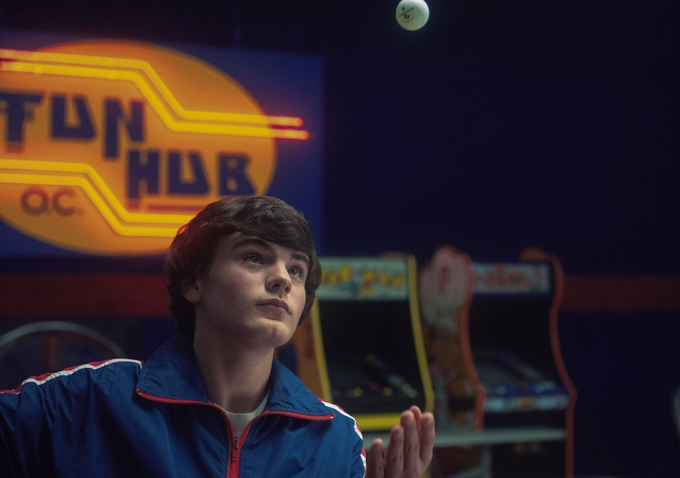
Any movie that is set in the eighties is going to, at least to some degree, depend on the honeyed glow of nostalgia to get it through the finish line. After all, it was a decade that most of us still remember and one that seems to have taken on a kind of rose colored tint in the years since, especially considering how few pieces of pop culture that are set in the period address how genuinely awful it all was (AIDS, Ronald Reagan, hair metal). What’s fascinating and kind of fun about Michael Tully’s charmingly low rent “Ping Pong Summer” is that it is a movie set in the Me Decade that is based almost exclusively on nostalgia. It doesn’t just help the movie get past the finish line; it props it up and holds it together. Without such a heavy emphasis on heart-shaped nostalgia, “Ping Pong Summer” would be nothing.
Taking place during the summer of 1985, “Ping Pong Summer” follows awkward ninth-grader Rad Miracle (Marcello Conte) as he travels with his parents (played by John Hannah and, in a wonderfully knowing nod, Lea Thompson) and grumpy goth sister (Helena May Seabrook) to the budget seaside resort of Ocean City, Maryland. It’s there that he meets a hip black kid named Teddy (Myles Massey), who introduces him to a local arcade where Rad can play his favorite game: ping pong. This is where he develops a crush on a pretty teenager named Stacy (Emmi Shockley), who he notices mixing in something suspicious into her Icees, and gets on the bad side of a preppy jerk in the “Karate Kid” mold (Joseph McCaughtry). And honestly… that’s pretty much it.

Tully is content to just have the concept sit there, without much in the way of inventiveness or subversion. Everything is telegraphed from a mile away and played out with rote typicality: the bully challenges Rad to a game, which leaves him flustered because, despite his enthusiasm, Rad just isn’t all that good. This is easily overcome when he meets a strange old woman played by Susan Sarandon, who keeps to herself and cultivates a witchlike mythology in the community. Turns out that she’s an old ping pong pro, and teaches Rad how to best his opponent (and look good in front of his crush while doing it). Yes, this movie is one talking Corvette away from being a live action remake of “Cars” (and countless others).
Everything about “Ping Pong Summer” is flimsy: the kids have trouble with some of the more dramatic moments in the script, and oftentimes feel like they can barely remember their lines. Conte in particular seems unsure of why anyone has bothered to put him in front of the camera. He has the opposite of charisma; every second he’s on screen he seems to be shrinking more and more into himself. And Massey isn’t much better. The plot, as much as there is one, doesn’t unfold as much as it limps along, with scenes that don’t build or collide as much as they sit beside each other peacefully and somewhat removed, content to merely drink in the on-location photography (Tully really did go to Ocean City to film) or period flourishes (some of which are spot on—we remember that little game that was full of water and had you pushing a button to send rings floating upwards).

But what “Ping Pong Summer” lacks in conviction or ingenuity, it makes up for in heart. The nostalgia that the entire film is built upon doesn’t seem misplaced. And you can tell that everyone on the production, from Tully on down, genuinely cared about this project and gave it their all, even if it didn’t amount to all that much. It’s hard not to get swept up in that. During one extended ping pong montage, Tully freezes the frame and pushes in. This could have been easily accomplished using digital technology, but it looks like Tully took an analogue approach; you can almost feel the grain intensify, as he gets closer. It’s a beautiful moment, one in which the nostalgia transcends into something deeper and more emotionally resonant.
These moments are few and far between, but they invigorate “Ping Pong Summer” and bring it ever so slightly out of the realm of pastiche and into a genuinely affecting coming-of-age story. At some point the nostalgia becomes something authentic and real and mixes with the kind of ramshackle charm of the rest of the movie (it’s got a “One Crazy Summer”-style animated title sequence for crying out loud). It would have been nice if Tully and his collaborators had tried to do something more than just a straight recreation. Even when the movie veers off into tangents, like one involving Amy Sedaris as the boy’s inappropriately sexy aunt, everything seems hermetically sealed and tightly controlled. In a weird way “Ping Pong Summer” represents the decade perfectly: full of promise, brightly colored, willfully upbeat, with a carefully cultivated soundtrack of synth pop and proto-hip hop and stuffed with wacky characters that want more than they have. Unfortunately, it’s just as empty. [B-]






Oh god, I hatttteeeedddddd this movie. Worst I saw at SXSW. As I said before, "A film about the 80s is supposed to make the audience feel a time and a place – to appreciate, or at least, understand it. To rely on nostalgia alone is never enough and results in something as uneven and pale as this. In the future, Tully oughta use nostalgia as a tool, not a crutch. Here though, he's nostalgia crutching so hard that it's no wonder the film can hardly stand on its own two feet."